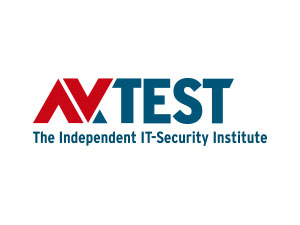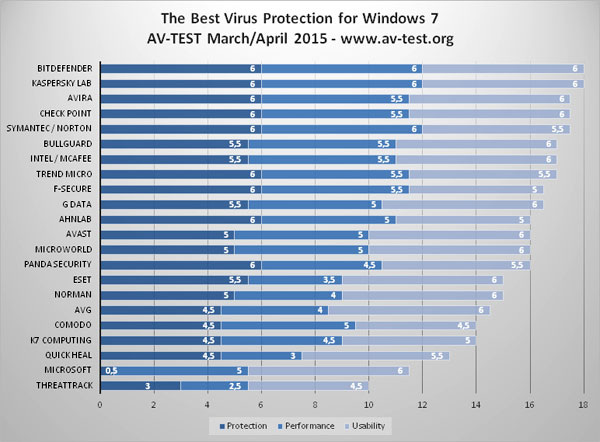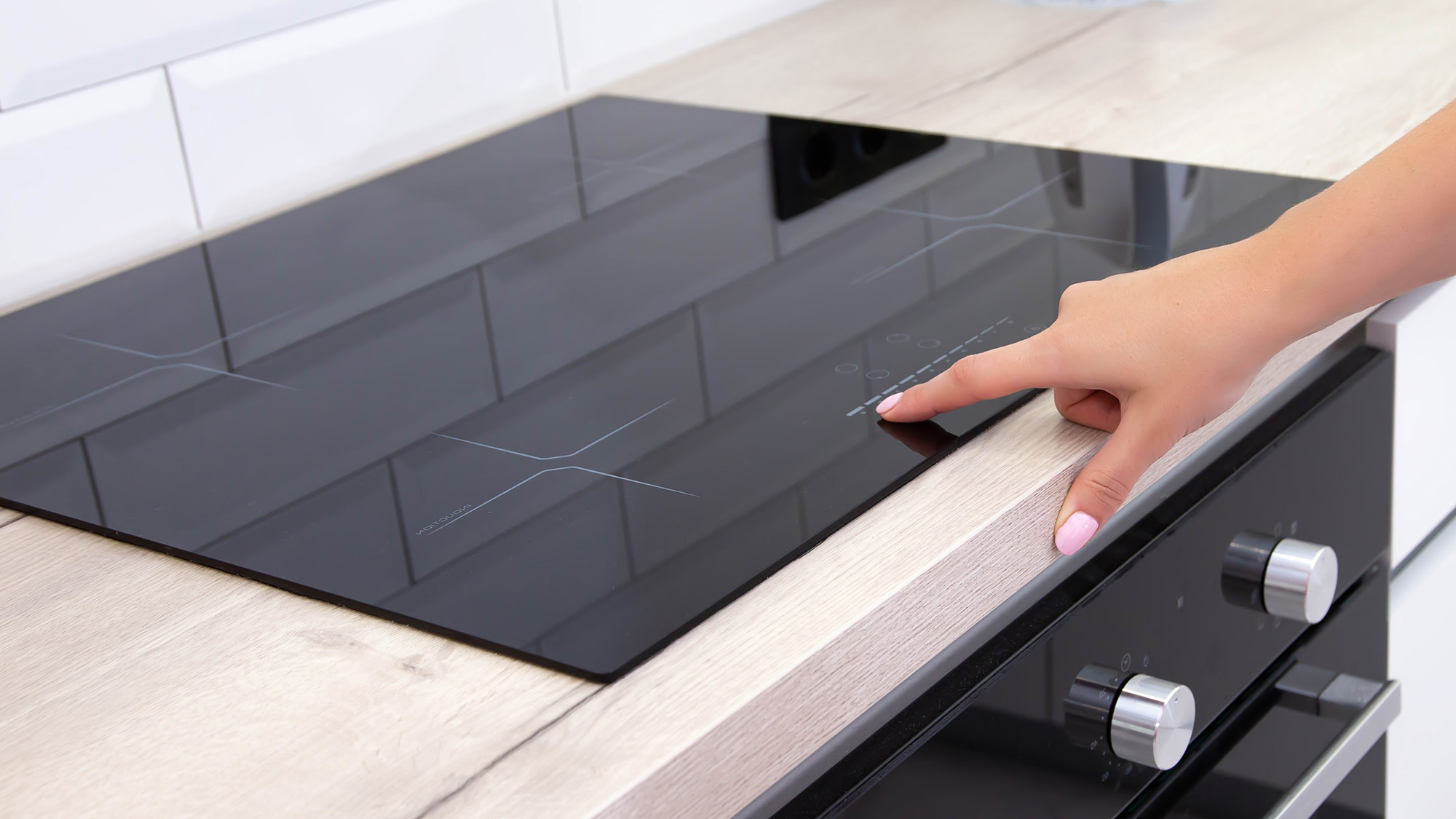Microsoft Takes Next-to-Last Place in Latest Antivirus Tests
World of antivirus testing thrown into chaos as ThreatTrack's VIPRE comes in behind Microsoft Security Essentials.


In a surprise upset, Microsoft's free Security Essentials antivirus software was edged out for the bottom ranking in German lab AV-TEST's latest round of Windows 7 security software, the results of which were released yesterday (May 27). Pipping the Windows maker for the dubious honor of dead last was VIPRE Internet Security, made by ThreatTrack Security of Clearwater, Florida.
Less surprising were the actual winners of the Windows 7 tests, which once again were Bitdefender Internet Security and Kaspersky Internet Security, each scoring a perfect score of 18 points distributed evenly across categories labeled Protection, Performance and Usability. The two products have each been at or near the top of AV-TEST's evaluations on all variants of Windows since mid-2011.
Meanwhile, rival lab AV-Comparatives released the results of its Linux antivirus evaluations. The Austrian lab didn't rank the 18 products it tested, or even give out scores, but products made by Dr. Web and ESET seemed to be the best options for home users.
MORE: Best Antivirus Software
Microsoft Security Essentials (MSE) and its Windows 8 counterpart, Windows Defender, usually come in last on AV-TEST's evaluations. That's as Microsoft intends it; the two are meant to provide only minimal protection against malware, the idea being that anything will be better than nothing (which is what about 20 percent of Windows users choose for antivirus protection).
So it's a bit harsh when a paid commercial product comes in behind Microsoft's free offering, as VIPRE just did. MSE actually scored far worse in AV-TEST's Protection category, meriting a truly dismal 0.5 out of 6 possible points detecting malware, against VIPRE's merely bad 3 out of 6.
What really put VIPRE ahead, or behind, in the shame game were its poor performance (2.5 out of 6), which created a nine-second delay in running everyday computing tasks, far worse than the industry average of two seconds, and mediocre usability (4.5 out 6) that generated nine false-positive malware detections against an industry average of four.
Sign up to get the BEST of Tom's Guide direct to your inbox.
Get instant access to breaking news, the hottest reviews, great deals and helpful tips.
MSE, on the other hand, has a Microsoft home-field advantage (despite being an optional add-on for Windows 7), scoring 5/6 in performance and a perfect 6 points in usability, detecting zero false positives.
Close behind Bitdefender and Kaspersky at the top of the Windows 7 evaluations were Avira Antivirus Pro, CheckPoint ZoneAlarm ExtremeSecurity and Symantec's Norton Security, all tied for third place with scores of 17.5. ZoneAlarm has been on a steady rise in the past few rounds, much improving on poor protection evaluations in 2013; Avira's top marks are a boon for users of Avira Free Antivirus, which uses the same malware-detection engine as its paid Pro sibling.
Absent from the rankings were Qihoo and Tencent, two Chinese companies whose products had rapidly risen in recent tests; Qihoo 360 even came in tied for first place with Bitdefender and Kaspersky in the most recent Windows 8 evaluations, released in March.
In a kerfuffle uncharacteristic of the normally staid antivirus-testing field, both companies earlier this month were accused of cheating on AV-TEST's evaluations by substantially altering their submitted software so that it performed better than what was made available to consumers.
Regarding Linux, AV-Comparatives' evaluation process was made more difficult by the sheer number of Linux variations (estimated to be well above 1,000), as well as by the fact that most Linux antivirus software is intended for corporate servers rather than home desktops. Nevertheless, the Austrian lab tried to run most of the 18 products on Ubuntu 14.04 LTS, perhaps the most common version of Linux on home machines.
Not surprisingly, Linux antivirus software intended for enterprise use tended to be the most feature-rich, and the offerings from the major companies — Bitdefender, Kaspersky, McAfee, Symantec and Trend Micro — followed this pattern. (Trend Micro wouldn't run on Ubuntu, so AV-Comparatives ran it on the Red Hat-based CentOS instead.)
However, the lab found that two other products, Dr. Web Anti-virus for Linux and ESET NOD32 Antivirus for Linux Desktop, both paid products, were well suited for home users, with the free Sophos Anti-Virus for Linux close behind.
- 10 Simple Tips to Avoid Identity Theft
- 7 Ways to Lock Down Your Online Privacy
- Best Wireless Home Security Cameras
Paul Wagenseil is a senior editor at Tom's Guide focused on security and gaming. Follow him at @snd_wagenseil. Follow Tom's Guide at @tomsguide, on Facebook and on Google+.
Paul Wagenseil is a senior editor at Tom's Guide focused on security and privacy. He has also been a dishwasher, fry cook, long-haul driver, code monkey and video editor. He's been rooting around in the information-security space for more than 15 years at FoxNews.com, SecurityNewsDaily, TechNewsDaily and Tom's Guide, has presented talks at the ShmooCon, DerbyCon and BSides Las Vegas hacker conferences, shown up in random TV news spots and even moderated a panel discussion at the CEDIA home-technology conference. You can follow his rants on Twitter at @snd_wagenseil.
-
Paul Wagenseil ReplyI'd like to see Malwarebytes included in this list.
Malwarebytes Anti-Malware isn't antivirus software. It doesn't prevent infections -- rather, it cleans up after the infection has already happened. That's why it can run alongside true antivirus software; two antivirus software packages running at the same time would slow down a machine drastically.
-
TheLoneWolf989 It's a shame Qihoo is no longer reviewed. They still make the best free anti-virus and you don't even think of paying for a service because it's that good.Reply -
Paul Wagenseil This is why Qihoo is no longer reviewed: http://www.tomsguide.com/us/qihoo-cheat-accusations,news-20867.htmlReply -
TheLoneWolf989 Reply16014137 said:This is why Qihoo is no longer reviewed: http://www.tomsguide.com/us/qihoo-cheat-accusations,news-20867.html
I know why they're no longer reviewed, removed by mod. As I said, it's a shame. Learn to read. -
Theminecraftaddict555 Reply16018693 said:16014137 said:This is why Qihoo is no longer reviewed: http://www.tomsguide.com/us/qihoo-cheat-accusations,news-20867.html
I know why they're no longer reviewed, removed by mod. As I said, it's a shame. Learn to read.
Calling him mentally ill doesn't make you look better in this thread, learn to respect people's mistakes/misunderstanding, we all make them sometime in our life
If he misunderstood what you said then again that is fine just simply correct him and the day is done, there was no need to increase your hostility in this thread -
TheLoneWolf989 Reply16020883 said:16018693 said:16014137 said:This is why Qihoo is no longer reviewed: http://www.tomsguide.com/us/qihoo-cheat-accusations,news-20867.html
I know why they're no longer reviewed, removed by mod. As I said, it's a shame. Learn to read.
Calling him mentally ill doesn't make you look better in this thread, learn to respect people's mistakes/misunderstanding, we all make them sometime in our life
If he misunderstood what you said then again that is fine just simply correct him and the day is done, there was no need to increase your hostility in this thread
There's ways to not make simple mistakes, in this case it's called proofreading. If that person is incapable of doing something as simple as that then they're clearly a removed by mod. I don't use that word without reason and quite frankly, you and all the other SJWs can go removed by mod yourselves. -
Theminecraftaddict555 Reply16021886 said:16020883 said:16018693 said:16014137 said:This is why Qihoo is no longer reviewed: http://www.tomsguide.com/us/qihoo-cheat-accusations,news-20867.html
I know why they're no longer reviewed, removed by mod. As I said, it's a shame. Learn to read.
Calling him mentally ill doesn't make you look better in this thread, learn to respect people's mistakes/misunderstanding, we all make them sometime in our life
If he misunderstood what you said then again that is fine just simply correct him and the day is done, there was no need to increase your hostility in this thread
There's ways to not make simple mistakes, in this case it's called proofreading. If that person is incapable of doing something as simple as that then they're clearly a removed by mod. I don't use that word without reason and quite frankly, you and all the other SJWs can go removed by mod yourselves.
So you are saying that you have every right to be mad over that misunderstanding that the OP made and that gives you the right to call someone a "retard", a mentally ill person....Why not stupid or dumb? It doesn't matter if he failed to proofread it and it was just a simple mistake not worth for any idiot to get pissed over about and call them a retard and we are not all that perfect. Wow I am guessing all the board members will be laughing at your posts after reading it....Enjoy your day telling people to go screw themselves....Well if you think that it will make you look smarter and better than anyone in this forum anyway..
Oh and I would recommend you to stop commenting on this thread at this point since it seems very irrelevant to the real topic and you talking more crap to me will drag it down even further so please do, unless you are trying very hard to get banned or something :)
-
Paul Wagenseil Oh dear. TheLoneWolf989, I wrote the original piece. I know what was in it. I wasn't sure if you had read it. If you are terribly offended by my erroneous presumption, then you may have issues that cannot be addressed in this forum. Best of luck.Reply -
Titillating Sanctions have been handed out and posts will be ret-conned to conform to the Rules of Conduct enforced within the Tom's communities. Please do not attack any individuals, writers or otherwise, or spew profanity. We're a family-friendly place.Reply

